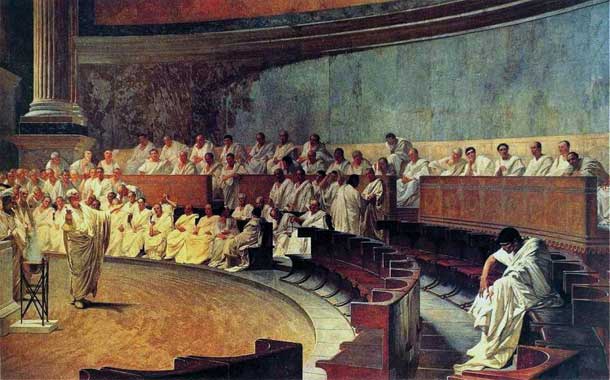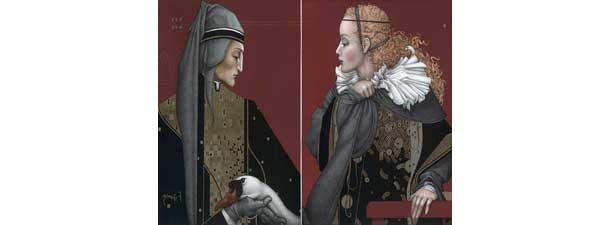
He’s Fifty, But He Doesn’t Look It
November 18, 2012
Food for thought
December 8, 2012“But I don’t want to go among mad people,”Alice remarked.
“Oh, you can’t help that,” said the Cat. “We’re all mad here. I’m mad. You’re mad.”
“How do you know I’m mad?” said Alice.
“You must be,” said the Cat, “or you wouldn’t have come here.”
– Lewis Carroll
Perhaps a lunatic was simply a minority of one. At one time it had been a sign of madness to believe that the Earth goes round the Sun; today, to believe the past is unalterable. He might be alone in holding that belief, and if alone, then a lunatic. But the thought of being a lunatic did not greatly trouble him; the horror was that he might also be wrong.
– George Orwell, 1984
It is never a good thing to wallow in gloom and doom but it is equally unsound practice to deny the critical state of the era we live in. Ours is as trying, dangerous, and complex an age as any that humanity has endured since we emerged from the Great Depression, two World Wars, post-Colonialism and the end of the Cold War. If we merely consider this simple list of historical precedents we must painfully acknowledge, as we greet 2013, that collectively we are not free from want, armed conflict, repression, tyranny or extremism. The logic of the greater good does not rule. The march of civilisation finds the road ahead uncertain. It is fraught with dangers, filled with a myriad of terrifying unknowns and as many dark certainties as we dare fathom. It is a truism to assert that the prognosis is fearful and fragile.
The growing prospect of global economic collapse has shadowed us since Dante’s inception. This has not remotely been lost on us when bringing Into the world a new magazine is, in the best circumstances, still mostly a matter of stubborn willpower and a healthy dose of denial. But Dante is also a child of our age and it inked its first pages as recession gripped us. It bore witness to the emergence of the international Occupy Movement and will continue to interpret the perils of Euro and Wall Street, both. And, if we cannot ignore the legions of disenchanted ordinary people taking to the streets, we acknowledge the marked difference between those demonstrating for fairness and those who give new versions of Fascist salutes. Those of us who work for Dante are Europeans, Americans and citizens from a host of nations in every continent on earth, of every possible race, religion, intellectual and cultural orientation. We regard this diversity and multitude of voices as our core strength. We do not consider just one parochial backyard but the larger mosaic of our common humanity and our common condition. We’re in this together with our readership, hoping for the best, preparing for the worst and trying to do the story justice, the colossal story of our times.
Thus we saw the Arab Spring unfold, with our partners at the Bikyamasr News Service in Cairo, close enough to smell the tear gas, just as we’ve known the true face of war firsthand in Iraq and Afghanistan. So it is with unease and revulsion that we observe the disintegration of Syria into a charnel house that could engulf the heart of the Middle East in a far larger slaughter, drawing its neighbours into the fray. It is with equal alarm that we see the spectre of war clouds looming between Teheran and Tel Aviv, just as the new bombs in Beirut make us shudder. Terror and terrorism in its many permutations, including the atrocities perpetrated by nation states, remain unwanted markers of our time. We are all held hostage by violence and the threat of violence from Homs to the mountains of South Kordofan, where Sudan’s latest genocide is unfolding.
We won’t even count all the wars here. There are just too many of them. But we take it as a positive sign that sanity and the logic of peace can sometimes prevail, as in the cases of the endless fratricides in the Philippines and Colombia where it seems the guns can stop – as we wish they would in Mexico, Mali, Congo, Somalia, the Ogaden, Pakistan, Yemen and Libya, to mention just a few.
As we’ve given shape to Dante during its short existence, we have shuddered as the oil spill in the Gulf of Mexico and the Mississippi Delta, in the worst natural disaster in US history, poisoned the environment on such a vast scale, and we’ve only begun to recover from the preventable Fukushima nuclear meltdown that will irradiate so much of Japan for generations to come. We draw as little comfort from the ongoing onslaught of climate change. Contrary to what the troglodyte nay-sayers may affirm, science has confirmed the polar ice cap is melting at an alarming rate, even if Amsterdam shouldn’t be evacuated just yet.
Our metier is to posit and discuss ideas – universal and self-evident ideas like the right to education, the equality of women, racial tolerance, freedom of expression, legitimate dissent and the right of survival itself. And when these things are silenced by an iron hand, from Moscow, to the Swat Valley to the Niger Delta and Darfur, Tunis and Teheran, we object unreservedly and regard it as our duty to raise the alarm. Journalism’s raison d’etre is to speak truth to power. This, more than ever, remains its highest calling and expression, no matter how cowed the Fourth Estate has become in many instances, not least in the United States, where the inhabitants of the last superpower serve neither themselves nor the planet well, in accepting such provincialism and corporatism from a press corps that was once one of the most unyielding in the history of the craft.
One such truth we present to all of the most powerful nations on earth, the mighty and the rich or the fierce that rule over us, whether we wish them to or not, is that to proceed as we are at present, is arguably quite insane. When it is possible to break the impasse in Syria through concerted international action, even by old adversaries, an unchecked escalation of the crisis benefits no one – it is, in fact, madness. To leave Israel and Iran to fan the fires of war is madness. To act in Somalia but to abandon Sudan is madness. To let the poorer countries in Europe slide into deeper bankruptcy and think the richer ones will weather the storm, when the very continuity of the EU is being challenged, is madness. To uphold the primacy of corporations over common citizens as a democratic principle and to cite economic growth in China as reason enough not to comply with greenhouse emissions standards is madness. To allow famine to ravage millions in the developing world because of the looming food shortage without preventative aid from the first world that can afford to feed them as well as condemning millions to die of infectious diseases in poorer countries by banning the sale of medically proven generic drugs so that Western pharmaceutical companies’ patent laws and profits aren’t infringed .. is madness. So is, too, to deny a woman’s right to choose what she will do with her own body and to legislate her inherent right to choice. To continue to argue that building more nuclear power plants is safe, after Fukushima, is madness. Insisting that a God enshrined as the essence of love, in whatever denomination, demands murder by divine decree is madness while others deny evolution and preach creationism – it is all complete and utter madness!. Some five centuries after the Renaissance, the very ideal that prompted us to found Dante, unashamedly we conclude that we live in a profoundly irrational age, with few of us immune from the slavish or willful absence of reason dominating our collective existence as peoples and societies.
So if we make the world a madhouse, are we not then, ourselves, mad? How should we respond to a looming new Dark Age disguised by all the trappings of so-called modernity and progress? We must tend to the soul. We must remember to live and not merely exist. We must ascend to loftier ground, pause to walk in the garden, to ponder the beauty, the brilliance, the genius and creativity of humanity. Dante will not stop celebrating this spark, which all the brutishness and ignorance in our baser selves seem incapable of extinguishing. And if solidarity and compassion are instincts as pronounced within us as our appetite for destruction, let us become the change we seek, despite the hardships and the odds against us. Let us banish the notion of improbable success and add our light to the sum of light, as Tolstoy implored us, to together defeat the beast of our own stupidity. Let the inmates take over the asylum and let us see who is truly mad. And if, alas, the existential fireball is inexorably coming towards us, then let us look to the dissenting hothouses of the human spirit in all their glory in Paris, Berlin, and the Harlem Renaissance in New York in 1939, before the juggernaut devoured us, as instructive examples. Things were hard then too, and they got harder. They’ll become more difficult now, too, no doubt. But when conformist irrationality is touted as both reason and as the natural order of conduct, then our refusal to participate in self-immolation is the method in the madness that makes us sane. I resist, therefore I am. Good tidings to all of you, dear readers, from all of us at the escape committee of Dante Magazine.




